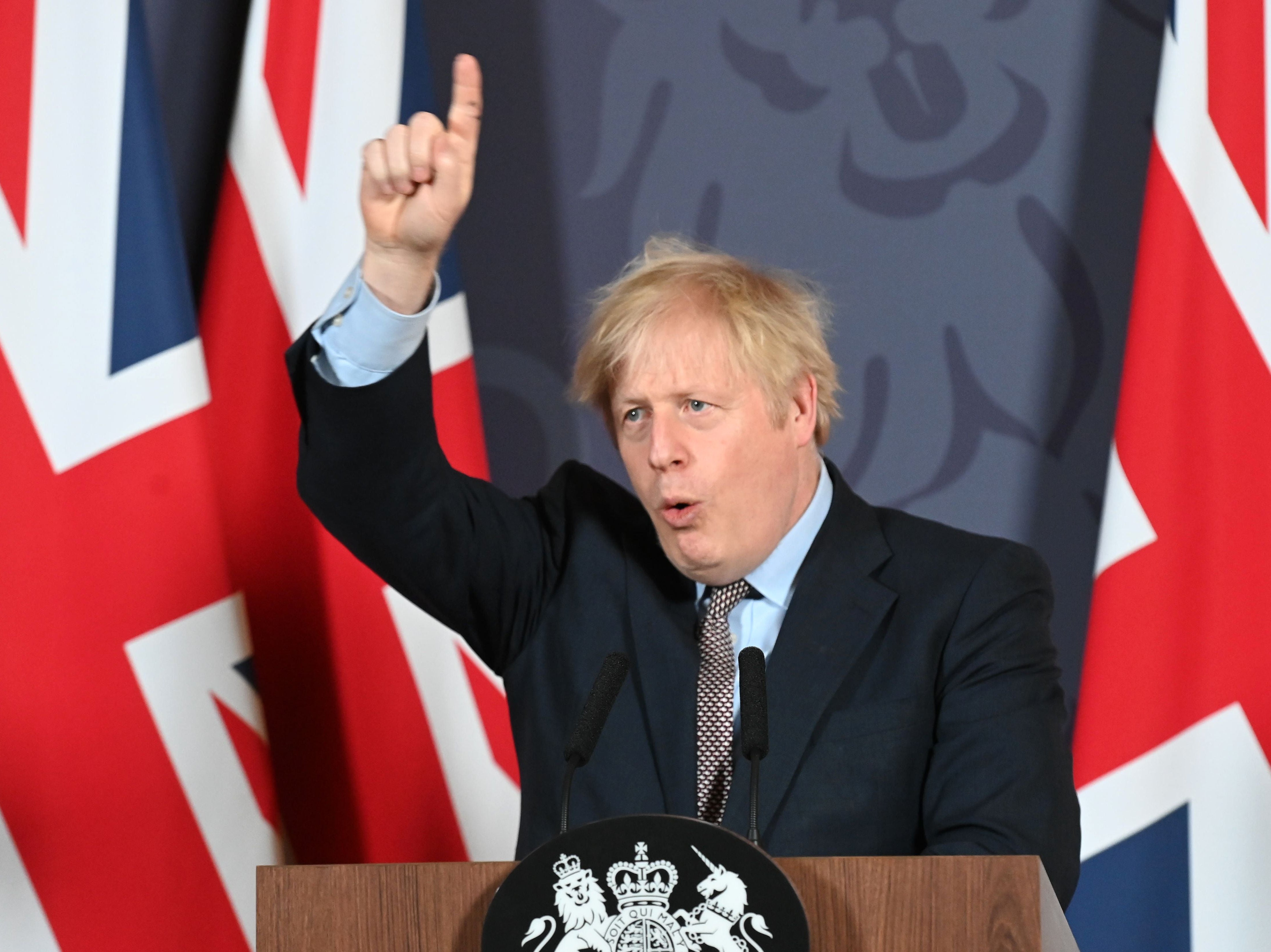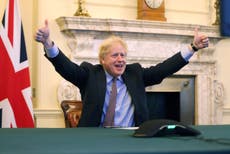Boris Johnson’s Brexit deal will give the PM a short-term boost – but now he has other problems to deal with
Coronavirus aside – by the next election, voters will be more interested in the state of the economy, their job prospects and cost of living, writes Andrew Grice


It was hardly surprising that Boris Johnson wrapped himself in the Union Flag as he began his campaign to sell the UK’s trade deal with the EU. Or that he replayed his greatest hit by recalling the Brexit referendum. “This deal expresses what the people of this country voted for in 2016,” he told a Downing Street press conference.
Some voters will buy the spin. The pro-Brexit newspapers, who are giving Johnson a hard time over his handling of the coronavirus pandemic, will revert to type and trumpet his deal. But his “jumbo Canada-style free trade agreement” is more of a mouse.
It is doubtful whether “the people” would have voted for such a hard Brexit if it had been spelt out in 2016; the expectation, encouraged by Vote Leave, was that the UK could leave the EU’s political institutions but still enjoy the economic benefits. Johnson and his fellow Leavers did not exactly rush to spell out the 4 per cent hit to GDP a Canada-style agreement would bring compared to continued EU membership, according to Treasury figures.
Typically, Johnson could not resist a spot of sleight of hand. “There will be no non-tariff barriers to trade,” he declared. That will come as a surprise to business, which even with a deal faces 250 million extra forms for customs and other regulations costing about £7bn. Later Johnson conceded that “things will change” on 1 January.
Many business people will greet the deal with a huge sense of relief that no deal has been avoided at the last minute. I suspect Johnson wanted and needed a deal all along; with his mounting crisis on coronavirus, he needed a political success. We’ll never know for sure whether he would have taken the UK over the no-deal cliff edge. Probably not, given the chaotic foretaste we have had in Kent this week.
I suspect the deal will help Johnson to bolster his support in the red wall of former Labour seats in the north and midlands which turned blue a year ago. His “get Brexit done” appeal was very successful then, and so many of these voters will like to hear his claim that he has now “taken back control” of the UK’s money, laws, borders and waters.
Some 2019 switchers to the Tories have turned away from them since, though not all have flocked back into Labour’s arms, with some now in the “don’t know” camp. Others do not want to admit they got it wrong at last year’s election and so are still giving Johnson the benefit of the doubt.
For voters outside the red wall, the deal will probably have less of an impact. Some will have noticed that the “oven-ready deal” Johnson promised at the election took a very long time to cook, and almost didn’t happen at all.
Former Remainers who hoped for a closer relationship with the EU will find little to cheer about. Johnson nodded in their direction by saying 2016 is “a long time behind us” and that most people “just want it [Brexit] settled and want us to move on”. Many people will agree, but will the Tories really want to end their Brexit-based culture war? I suspect not.
Keir Starmer has every incentive to “move on”, as he called for the country to do on Thursday, while Johnson does not. He senses that Brexit is Starmer’s weak spot, as the driver of Labour’s 2019 policy of a Final Say referendum. Johnson claims Starmer wants to take the UK back into the EU, which is not true. The Labour leader will order his MPs to vote in favour of the deal next Wednesday, saying a future Labour government would try to “make this deal work” and improve on it.
Johnson will no longer be able to blame Brussels for his government’s inability to act, since he is the architect of the UK’s new relationship with the EU. Although his tone towards “our friends and partners” was conciliatory, he might think a bout of Brussels-bashing would help him domestically when disputes arise over the treaty. Brexiteers will egg him on to test the UK’s ability to diverge from EU standards; the disputes mechanism in the agreement will be needed.
Yet the electoral benefit from playing the EU card might be smaller than Johnson hopes. He will want to remind voters he “got Brexit done”, but they have a habit of looking to the future rather than thanking politicians for past achievements.
Johnson will not win the next election with a battle plan for the last war. In the short term, the public will judge him more on his response to the pandemic, from which landing the deal will provide only a very brief respite.
By 2024, voters will be more interested in the state of the economy, their job prospects and cost of living and whether Johnson achieved his other 2019 pledge to “level up” the poorest regions, a huge task made even more difficult by coronavirus.




Join our commenting forum
Join thought-provoking conversations, follow other Independent readers and see their replies
Comments